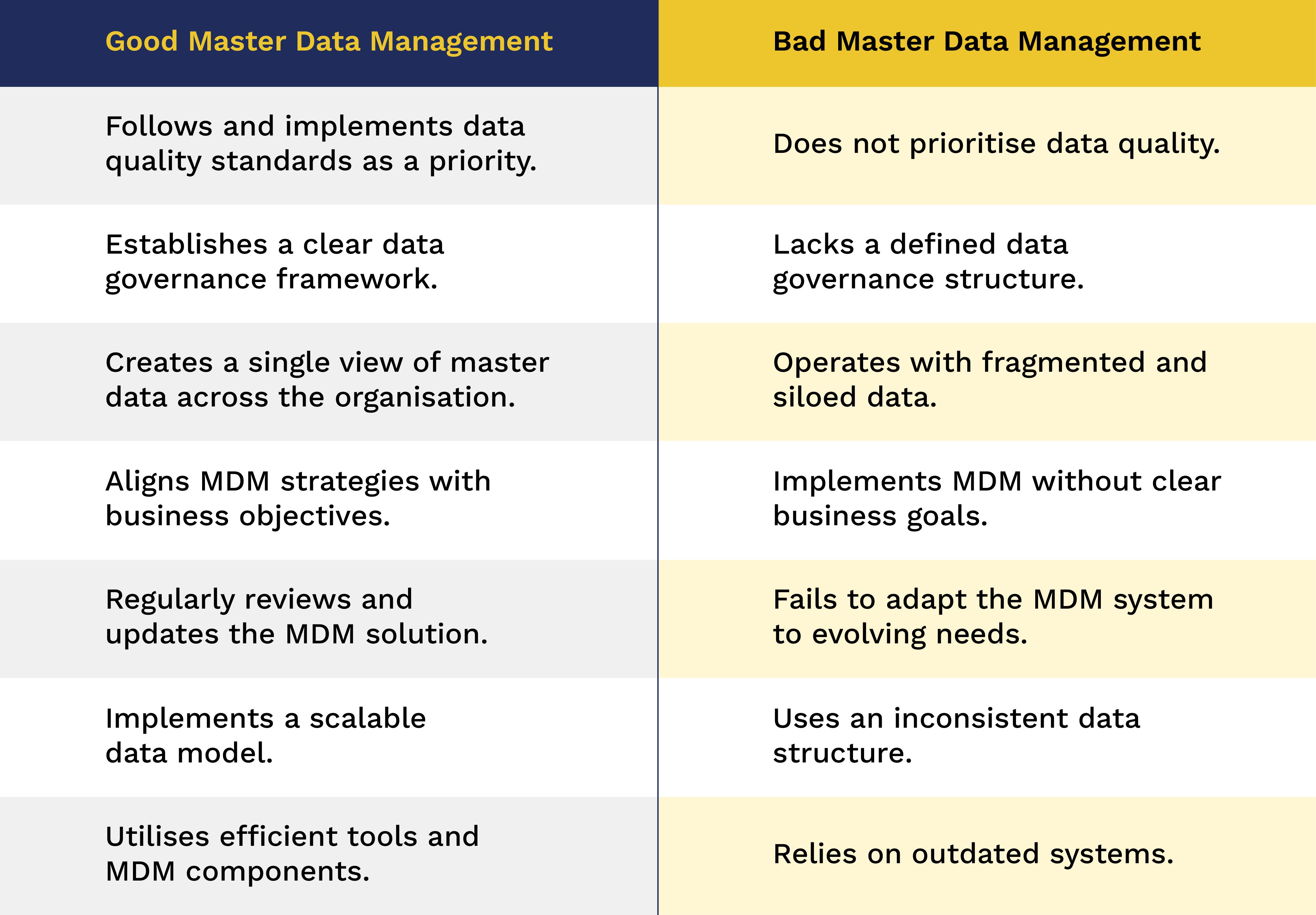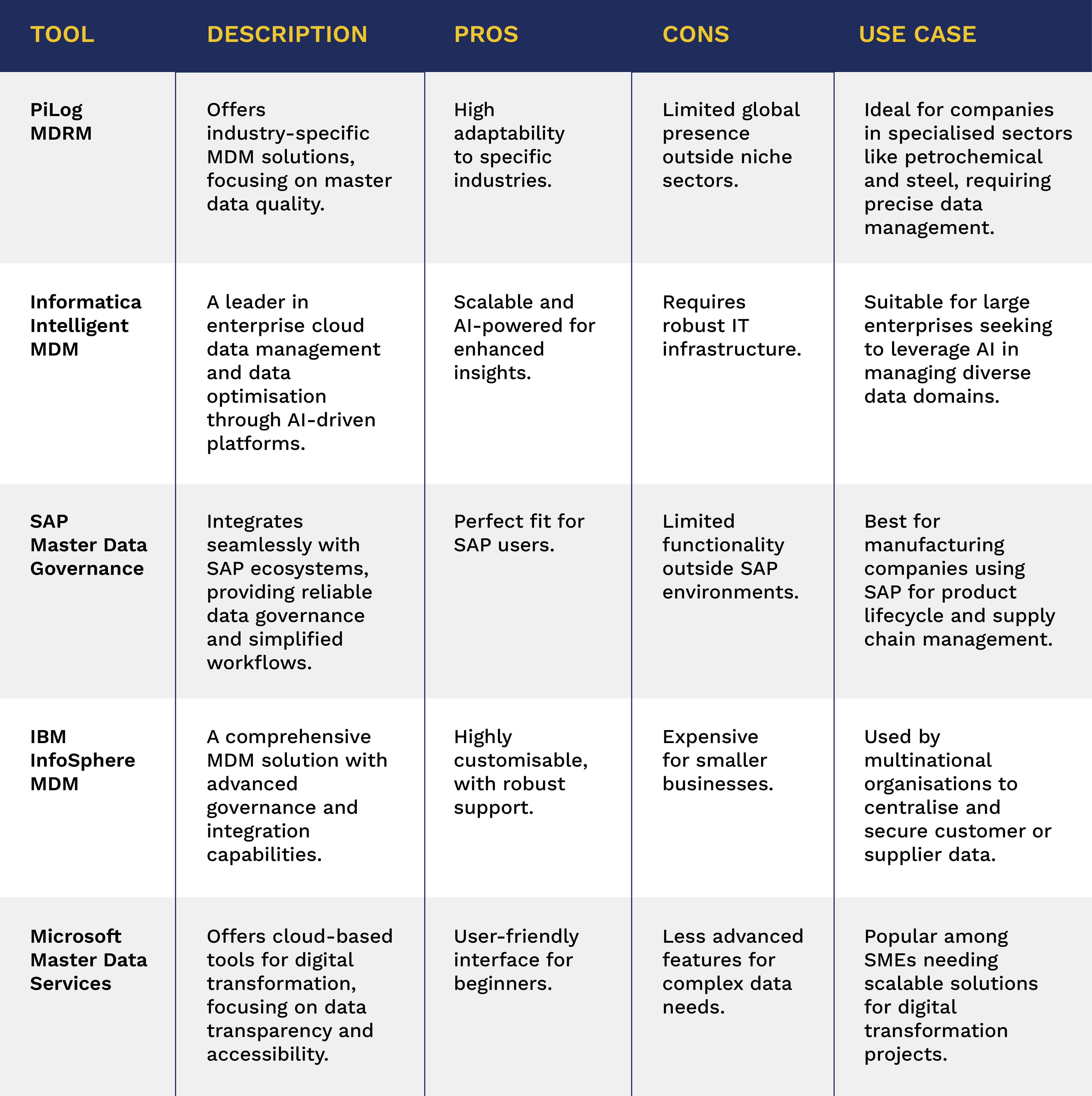Master Data Management: Strategies for Long-Term Success

Consider this: In the US alone, the yearly cost of poor-quality data is USD 3.1 trillion. This is where Master Data Management (MDM) comes in, as organisations look to both reduce the cost of erroneous data and increase the value of data-driven decisions.
According to McKinsey’s Master Data Management Survey, organisations are maturing their MDM capabilities to improve customer experience and satisfaction, enhance revenue growth, and increase productivity.
Whether you're an aspiring master data analyst or a seasoned professional, understanding Master Data Management (MDM) and its strategies is key to ensuring data consistency, improving operational efficiency, and driving long-term business success.
What is Master Data and Master Data Management?
Master data is an umbrella term that refers to all the data a business needs to be operational. It’s usually shared across the enterprise and is used across departments for decision-making.
MDM, meanwhile, is a discipline aimed at providing an accurate single view of master data, eliminating data silos and inconsistencies that may arise from disconnected systems.
Good vs Bad Master Data Management
Effective MDM is crucial for organisations looking to leverage their data for informed decision-making. However, poorly executed MDM can result in wasted time, effort, and money.
Take, for example, a mid-sized wholesale electronic markets broker that faced critical challenges in data management, impacting strategic decision-making. As a result, the organisation experienced a 20% decrease in sales due to outdated data systems.
To avoid such pitfalls, it's essential to understand the principles of good and bad MDM.

7 Best Practices for Master Data Management
Without a robust MDM strategy, businesses might face fragmented data, duplication, and costly inefficiencies. Here are some best practices to consider:
1. Define and Prioritise Data Domains
Identify your business's most critical data domains, such as customers, products, or suppliers. This ensures that your MDM approach focuses on the areas that will deliver the most significant value.
2. Establish a Strong Data Governance Framework
Data governance is essential for ensuring data accuracy, consistency, and compliance. A well-defined framework clarifies roles, responsibilities, and processes for managing master data throughout its lifecycle.
3. Develop a Comprehensive Data Model
Master Data Modelling is an information model used to portray the business concept and dependency. It also helps point out how business entities interact with each other. A well-structured data model provides a clear and consistent definition of your master data, facilitating data integration and analysis across the organisation.
4. Ensure Data Quality
Implement data quality rules and processes to cleanse, standardise, and validate your master data. This ensures that your MDM system contains accurate and reliable information.
5. Embrace Cloud Technology
Cloud-based MDM solutions offer scalability, flexibility, and cost-effectiveness. It can also increase productivity and efficiency. For example, a retailer using cloud-based centralised data repositories can store and manage customer data from physical stores, e-commerce platforms, and mobile apps. Automated data synchronisation eliminates duplicates and reduces errors, while real-time updates ensure consistent product information, pricing, and inventory levels across all channels.
6. Foster Collaboration
Successful MDM requires collaboration between IT and business stakeholders. Ensure that all relevant parties are involved in the planning and implementation process.
7. Monitor and Measure Performance
Regularly track key metrics to assess the effectiveness and impact of your MDM strategy and identify areas for improvement.
Top Master Data Management Tools
In a data-driven landscape, understanding different Master Data Management (MDM) tools is paramount. These tools support informed decision-making and strategic planning, empowering organisations to maintain a competitive edge.
Below are 5 prominent MDM solutions, each with distinct features and benefits that can help data professionals to streamline their data management processes.

Master in Data Science: Elevate Your Skills in Big Data
Effective MDM is less about data management than it is about guiding people, processes, and technology towards effective decision-making driven by data. A strong MDM framework can lead to improved operational efficiency, better customer experiences, and increased revenue.
Sunway University's 100% online Master in Data Science arms you with the cutting-edge skills to unlock the vast potential of big data. With a comprehensive curriculum designed to address the industry's growing demands, you'll gain expertise in extracting valuable insights, developing predictive models, and driving business growth through data-driven decisions.
Whether you're an aspiring data professional or a master data analyst looking to advance your career, pursuing professional development is essential in this dynamic field. Take the next step in your journey by scheduling a personalised eligibility check with our Education Counsellors today.





